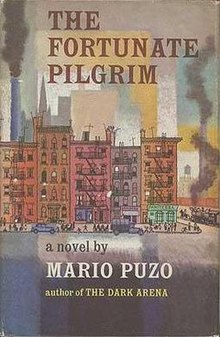The Fortunate Pilgrim
This article needs additional citations for verification. (September 2014) |
 First edition | |
| Author | Mario Puzo |
|---|---|
| Language | English |
| Genre | Crime novel |
Publication date | 1965 |
| Publication place | United States |
| Media type | Print (hardback & paperback) & Audiobook |
| Pages | 544 pp (Paperback edition) |
| ISBN | 0-449-00358-2 (Paperback editions) |
| OCLC | 39560711 |
| Preceded by | The Dark Arena |
| Followed by | The Runaway Summer of Davie Shaw |
The Fortunate Pilgrim is a 1965 novel by Mario Puzo.[1]
Until his dying day, Mario Puzo considered the novel his finest, most poetic, and literary work. In one of his last interviews he stated that he was saddened by the fact that The Godfather, a fiction he never liked, outshone the novel of his mother's honest immigrant struggle for respectability in America and her courage and filial love, as portrayed in The Fortunate Pilgrim, 1965.
The Fortunate Pilgrim, though it won much literary praise from established American novelists, never earned Puzo a living. It was only when he opted for what Hollywood sold well to America, the stereotype of Italian immigrants as mobsters, that Puzo acquired fame and fortune commensurate with his stature as a writer.
The Fortunate Pilgrim is the real birthplace of The Godfather. As Puzo says, the book's hero, Lucia Santa, is based on his own mother: "Whenever the Godfather opened his mouth, in my own mind I heard the voice of my mother. I heard her wisdom, her ruthlessness, and her unconquerable love for her family and for life itself. … The Don's courage and loyalty came from her; his humanity came from her… and so, I know now, without Lucia Santa, I could not have written The Godfather."
Synopsis
The novel tells the story of the Angeluzzi-Corbos family, a family of immigrants living an adopted life in New York City. The head of the family is Lucia Santa, a wife, widow and mother of two families. It is her formidable will that steers them through the Great Depression and the early years of World War II. But she cannot prevent the conflict between Italian and American values.
Film adaptation
in 1988, the novel was turned into a mini-series with Sophia Loren in the lead role.
References
- ^ "The Fortunate Pilgrim by Mario Puzo". goodreads.com. Retrieved 2014-06-16.
External links
